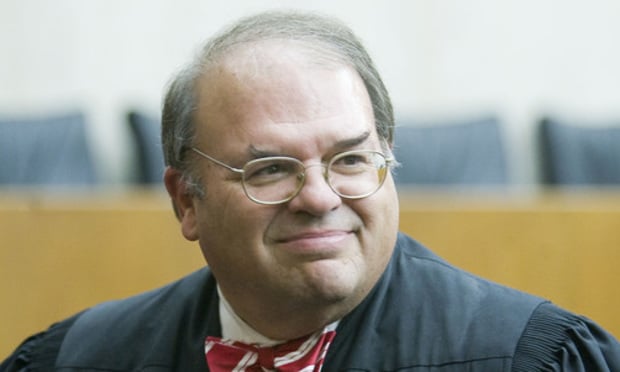 Judge Richard Leon of the U.S. District Court for the District of Columbia. (Photo: Diego M. Radzinschi/THE NATIONAL LAW JOURNAL)
Judge Richard Leon of the U.S. District Court for the District of Columbia. (Photo: Diego M. Radzinschi/THE NATIONAL LAW JOURNAL)
A federal judge who had grilled CVS Health and Aetna Inc. officials as well as industry experts about the health giants' proposed merger on Wednesday gave his seal of approval to the $69 billion acquisition.
U.S. District Judge Richard Leon previously appeared skeptical of the merger, particularly after Department of Justice attorneys swiftly presented him with an option to approve the deal after filing their challenge to the merger. He held two days of hearings in June to hear testimony over the potential impact of the merger and at times criticized Main Justice and the companies over their conduct during the deal.
Related: DOJ may have jumped the gun on its CVS-Aetna approval
But on Wednesday, Leon found that the evidence presented to him by the health companies was enough to ease any antitrust concerns he had about the major merger, including reduced competition for prescription drug programs.
Leon wrote that while outside groups that opposed the merge shone "a healthy light" on the deal and their concerns, they "did not substantially undermine the parties' public interest position by persuasively demonstrating that their concerns currently exist or are likely to develop."
The two companies said in a joint statement that CVS and Aetna "have been one company since November 2018, and today's action by the district court makes that 100 percent clear."
"We remain focused on transforming the consumer health care experience in America," the statement read.
CVS and Aetna tapped attorneys from several firms to boost their defense of the merger, including lawyers at Williams & Connolly, Dechert and Davis Polk & Wardwell.
Under the terms of the Justice Department settlement, Aetna agreed to divest its Medicare Part D prescription drug programs to WellCare Health Plans Inc., an independent competitor.
Leon found that for each issue of competition raised by the outside parties, such as potential harm to some HIV-AIDS patients and for pharmacy benefit management, the arguments and evidence presented by CVS, Aetna and the Justice Department outweighed or disproved those claims.
The outside groups, including the American Medical Association, Consumer Action, the AIDS Healthcare Foundation and U.S. PIRG, had challenged the merger over concerns it would impact competition in the health care field and harm patients.
"Although amici raised substantial concerns that warranted serious consideration, CVS's and the government's witnesses, when combined with the existing record, persuasively support why the markets at issue are not only very competitive today, but are likely to remain so post-merger," Leon wrote.
The judge was reviewing the DOJ's settlement that allowed for the merger to take place under the Tunney Act, which allows courts to determine if such settlements are in the public interest.
The two companies wrapped up their merger in November 2018, but a frustrated Leon scolded DOJ attorneys at the time of the public announcement. He asked the parties to hold off from officially working as one company until he gave his final seal of approval.
Read more:
© 2025 ALM Global, LLC, All Rights Reserved. Request academic re-use from www.copyright.com. All other uses, submit a request to [email protected]. For more information visit Asset & Logo Licensing.







